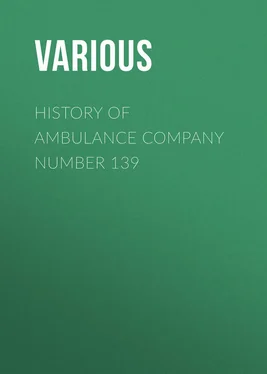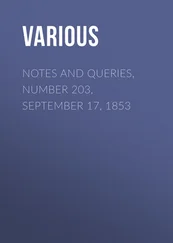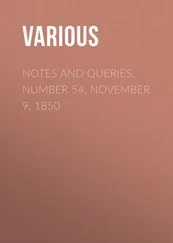Various - History of Ambulance Company Number 139
Здесь есть возможность читать онлайн «Various - History of Ambulance Company Number 139» — ознакомительный отрывок электронной книги совершенно бесплатно, а после прочтения отрывка купить полную версию. В некоторых случаях можно слушать аудио, скачать через торрент в формате fb2 и присутствует краткое содержание. Жанр: Медицина, История, foreign_edu, на английском языке. Описание произведения, (предисловие) а так же отзывы посетителей доступны на портале библиотеки ЛибКат.
- Название:History of Ambulance Company Number 139
- Автор:
- Жанр:
- Год:неизвестен
- ISBN:нет данных
- Рейтинг книги:4 / 5. Голосов: 1
-
Избранное:Добавить в избранное
- Отзывы:
-
Ваша оценка:
- 80
- 1
- 2
- 3
- 4
- 5
History of Ambulance Company Number 139: краткое содержание, описание и аннотация
Предлагаем к чтению аннотацию, описание, краткое содержание или предисловие (зависит от того, что написал сам автор книги «History of Ambulance Company Number 139»). Если вы не нашли необходимую информацию о книге — напишите в комментариях, мы постараемся отыскать её.
History of Ambulance Company Number 139 — читать онлайн ознакомительный отрывок
Ниже представлен текст книги, разбитый по страницам. Система сохранения места последней прочитанной страницы, позволяет с удобством читать онлайн бесплатно книгу «History of Ambulance Company Number 139», без необходимости каждый раз заново искать на чём Вы остановились. Поставьте закладку, и сможете в любой момент перейти на страницу, на которой закончили чтение.
Интервал:
Закладка:
On August 13th the boys received their physical examination. A few were disappointed at that time to find that they could not pass the examination and go along with the company. That afternoon Captain Arthur L. Donan of the 3rd Kentucky Infantry placed himself before the company and mumbled a few words. After the company was dismissed the main question was, "What did the captain have to say?" It was soon found out that he had mustered us into Federal Service.
On the Saturdays of the first two weeks at camp we were treated fine (just kidding us along). On the third Saturday we were lined up in formation and were sent to the infirmary. There we were told to get ready for the worst. Both arms were bared while iodine swabs, the medics' famous panacea, were thrown around freely. There were three doctors in one corner ready for action. Two of them were puncturing the right arms with needles and with a little push of a plunger our body was given some extra fluid so that we might be able to combat that great army disease of former years, typhoid fever. The other doctor was cutting a few nitches in the boys' left arms so that the smallpox vaccine could do its duty. Fainting was in order on that day, as well as on the following three Saturdays, when the puncturing process was repeated, and no member of the company was slighted.
The mothers of Kansas City made army life, while we were at Camp Hoel, as pleasant as possible. On different days we received a basket dinner, a watermelon feast and an ice cream and cake festival from them. Those days were the frequent topics of conversation during the boys' stay in France and will never be forgotten. Shows were always at hand in Kansas City and on certain afternoons theatre parties were formed by the members of the company.
September 27th was the fatal day for Kansas Ambulance Company No. 2 in Kansas City, Kansas. On that day camp was broken and the company was formed. We left our camp and marched to the train behind the famous Kilties Scotch Band, which led us down Minnesota Avenue through the great crowds that had gathered along the street to cheer us on our way. We boarded the train at Third and Washington Boulevard, where the boys bid their dear ones "goodbye."
TRAINING AT CAMP DONIPHAN
When that Frisco troop train pulled out of Kansas City, Kansas, on September 27th, 1917, it cannot be said that it carried a very hilarious bunch of soldiers. The men, the majority of whom had never been away from home before for any length of time, had just spent a last few happy days with the home folks, sweethearts and friends and now they were going out into a new life, into new environments and with unknown problems and experiences ahead of them. They were quiet at first, no doubt wondering what was in store for them before they saw "home" again, but as they left Kansas City far behind their quietness disappeared and soon little groups were chattering at a lively rate.
After an uneventful trip the troop train carrying Kansas Ambulance Companies No. 1 and 2 and one field hospital company arrived at the Fort Sill railroad yards at about 4:30 P. M. on September 28th. After a short delay the companies started their march toward the area on the south side of the camp, designated for the Sanitary Train, and right then and there they were introduced to that for which Camp Doniphan is noted – DUST – five or six inches of it on every road. What a hot, dirty hike that was, unaccustomed as the men were to those ungainly, heavy packs! And when Kansas Ambulance Company No. 2 (later designated as Ambulance Company 139) reached camp did they find comfortable tents or barracks to step into? They did not. True, tents were there, but they were in wooden crates, and there was a long, vacant space between a mess hall and a bath house on which those tents were to stand. Fate was with the men that night, for the moon was shining brightly, so after a supper of crackers and cheese they soon had twelve Sibley tents pitched on the allotted space. Tired from their trip and work litters made excellent bunks and the men slept the sleep of the weary, their first night under real army conditions.
Army life, as experienced in those first six weeks at Camp Doniphan, can scarcely be called a picnic. If there had been floors in the tents, and if you could have turned a switch instead of having to light a candle in order to have light, and if there had been an adequate supply of good water, and if "DUST," in vast quantities, had not been a "regular issue" – well, such was life at Doniphan for the first few weeks.
However, by Thanksgiving, many improvements had been made. Good water was piped from a lake some distance from the camp and no longer was moss and like substances found in the water that came through the pipes. Nor was it necessary to watch all the dust of Kansas blow by from the north in the morning, with a return trip in the afternoon. The tents were floored and sidings put on, and electric lights were installed; Sibley stoves were issued, together with an ample supply of wood – all of which made the life at Camp Doniphan a little more attractive. A large boiler and tank was installed in the bath house, giving the men plenty of hot water for bathing and washing clothes. Military training continued, of course, consisting of drilling on the field and lectures in the mess hall by medical officers on subjects essential to the work of sanitary troops. This included practice in the use of bandages and splints and litter drill.
The Thanksgiving and Christmas holidays brought many visitors to camp – mothers, brothers, sisters and friends, all anxious to see for themselves the Army life that the men had been writing about. If any of the mothers had been worrying about the "beans and hard-tack" which is supposed to be an unvarying part of a soldier's menu, they returned home with that worry eliminated, for on both Thanksgiving and Christmas, "John," the red-headed chef of the company, brought forth dinners that would make the "Plantation Grill" or the "Pompeien Room" sit up and take notice. Turkey, all you could eat and with all the trimmings, and the dessert of mince pie and fruit cake, made one think of "Home, Sweet Home" and Mother's incomparable cooking. As a whole, Army feed wasn't half as bad as it was supposed to be. How could it be, when flapjacks, sausage, steak and pie were regular issues?
The winter of 1917–18, according to the "natives," was the worst in Oklahoma for fifteen years, and those reports will never be questioned by the men who were at Doniphan that winter. More than once they awoke in the morning to find three or four inches of snow on the tent floor. However, unaccustomed as the men were to living in tents in cold weather, there was a comparatively small amount of sickness. True, a number of the men were sent to the Base Hospital, with measles, influenza and pneumonia, and several times the company was quarantined, but very few of the cases proved serious, and sooner or later the men returned to duty.
For several months, both the Base Hospital and the Isolation Camp were in need of Medical men, and details from the Sanitary Train were sent to relieve the situation. The men were put to work at anything from nurse to Supply Sergeant, and this work gave them some good, practical experience along medical lines. Just before Christmas, the company received twelve G. M. C. Ambulances, and for the remainder of our stay at Doniphan these ambulances were used for evacuation work between the Base Hospital and the different units of the Division.
Not all of the training at Doniphan was along medical lines, however. At regular intervals you could expect to find your name on the Bulletin Board under the heading "Kitchen Police," and when it wasn't that, it was probably for a tour of guard duty, and if you were lucky enough to miss both of those details, it was seldom that you weren't picked for company fatigue.
Читать дальшеИнтервал:
Закладка:
Похожие книги на «History of Ambulance Company Number 139»
Представляем Вашему вниманию похожие книги на «History of Ambulance Company Number 139» списком для выбора. Мы отобрали схожую по названию и смыслу литературу в надежде предоставить читателям больше вариантов отыскать новые, интересные, ещё непрочитанные произведения.
Обсуждение, отзывы о книге «History of Ambulance Company Number 139» и просто собственные мнения читателей. Оставьте ваши комментарии, напишите, что Вы думаете о произведении, его смысле или главных героях. Укажите что конкретно понравилось, а что нет, и почему Вы так считаете.












